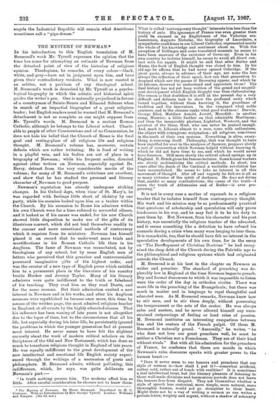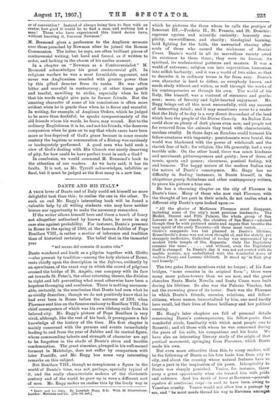THE MYSTERY OF NEWMAN.* IN his introduction to this •
English translation of M. Bremond's work Mr. Tyrrell expresses the opinion that the time has come for attempting an estimate of Newman from the detached point of view of the historian of religious • opinion. Theologians, he remarks, of every colour—black, -white, and grey—have sat in judgment upon him, and have given their contradictory verdicts. What is now wanted is an arbiter, not a partisan of any theological school. M. Bremond's work is described by Mr. Tyrrell as a 'psycho- - logical biography in which the artistic and historical spirit
guides the writer's pen. One is naturally prejudiced in favour of a countryman of Sainte-Beuve and Edmond Scherer when in search of an impartial biographer of a great religious leader; but English readers must be warned that M. Bremond's detachment is not so complete as one might suppose from Mr. Tyrrell's words. M. Bremond is a zealous Roman Catholic, although he belongs to the Liberal school. Charit- able to people of other Communions and of no Communion, be does not hide his belief that the Church of Rome is the final goal and resting-place of all religious life and religious thought. Alf. Bremond's volume has, moreover, certain defects which are rather irritating. He is fond of writing in a playful vein, and his frolics are out of place in a biography of Newman ; while his frequent asides, directed against • other writers on Newman, especially against Dr. Barry, detract from the very considerable merits of the volume; for many of M. Bremond's criticisms are excellent, and show that he has studied the personal and literary character of Newman to good purpose.
.Newman's reputation has already undergone striking changes. In his Oxford days, when vicar of St. Mary's, he was regarded with feelings little short of idolatry by one party, while his enemies looked upon him as a traitor within the Church. By his secession to Rome his admirers within his own Church were for a time reduced to sorrowful silence, • and it looked as if his career was ended, for his new Church showed little disposition to make use of the gifts of its illustrious convert, which did not lend themselves readily to the coarser and more sensational methods of controversy which it requires from its ministers. -Newman has himself placed" it on record that he underwent more trials and mortifications in his Roman Catholic life than in his Anglican. The fame of Newman was resuscitated, not by theologians of any school, but by some English men of letters who perceived that this preacher and controversialist possessed imaginative gifts of the highest order, and was the creator of a new type of English prose which entitled him to a permanent place in the literature of his country beside Hooker and Jeremy Taylor. Many of his literary admirers were quite indifferent to the truth or falsehood of his teaching. They read him as they read Dante, and for the same reasons. But their admiration excited a new interest in Newman and in his works, and after his Anglican sermons were republished lie became once more, this time by means of the written page, the most admired religious teacher • in England, at all events by the highly educated classes. That his influence has been waning of late years is not altogether due to the lapse of time, but to the circumstance that all his life, but especially during his later life, he persistently ignored the problems in which the younger generation feel at present • most interest. He never' seems to have felt the slightest curiosity about the work of modern critical scholars on the Scriptures of the Old and New Testament, which has done so much to transform religious thought in England of lite years. He was equally indifferent to the great development of" the new intellectual and emotional life English society experi- enced through the writings of a succession of poets and philosophers. M. Bremond admits, without palliating, this indifference, which, he says, was quite deliberate on Newman's part :—
" In truth nothing presses him. The moderns affect him so little. After careful consideration ho chooses not to know them.
• The Mystery of Newman. By Henri Breuioud. Translated by II. C. ' Cormuoe. With au Introduction by Bey. Cieori§c Tyrrell Loudon: Williams and Norgate. flea. Gd. net.] What is called `contemporary thought' interests him less than the history of ants. His ignorance of France was even greater than could be excused in an Englishman of the Victorian era. Lamennais, Auguste Nicholas, the biography of Lacordaire, a sympathetic confidence in our Liberal Catholics, represented nearly the whole of his knowledge and sentiment about us. With the exception of Dollinger and some translated manuals lie seems to have been unaware of the existence of Germiny. Even in his own country he isolates himself, he seems to avoid all direct con- tact with his equals. It might be said that. after Butler and flume, the book of English thought was closed to him. In his old age he affirms that he had never opened Coleridge. If the great poets, always in advance of their age, are none the less always the reflection of their epoch, how can that generation ba despised which saw the poems of Browning appear, and which by its labours, deserved to understand and appreciate them.? The final history has not yet been written of the grand and magnifi- cent development which English thought was then elaboratoring. The reason is that doubtless it is still at the present day a very difficult and delicate task to show the profound unity which bound together, without them knowing it, the guardiaus of tradition and the innovators. In the vanguard what noble geniuses, and in the obscure ranks what good workmen ! Darwin, George Eliot, Matthew Arnold, Jowett, Meredith : in another camp, Maurice : a little further on that admirable Martineau ; and then the inseparable phalanx, Lightfoot, Westcott, and the greatest of the three, Hort, who can never be praised enough. And, mark it, Liberals almost to a man, some with enthusiasm, the others with courageous resignation : all religious, sometimes in the teeth of their own systems. Everything is alive, every- thing is. renewing itself. Philosophy, that. was thought to have been ingulfed for ever in the analyses of Spencer, .prepares sloWly a sort of resurrection which Newman helped without knowing it, which he did not have time to see, and which he would never have foreseen. Still more slowly the critical school springs up in England. E. Hatch gives his famous lectures. Some honest workers are slowly acclimatising the critical methods. In short, ten years after the death of the Cardinal a veritable revolution has been accomplished.- He seems to take no interest in all this movement of thought. Afar off and vaguely he follows it all as so many victories of the spirit of darkness. He does not divine that, amidst so many contradictions, the cause of the truth—I mean the truth of Athanasius and of Butler—is ever pro- gressing."
It is not in every case a matter of reproach to a religious
teacher that' he isolates himself from contemporary thought. His work and his mission may be so predominantly practical that questions of scholarship and speculation will only prove hindrances in his way, and lie may feel it to be his duty to pass them by. But NeWman, from his character and his past history, was essentially the religious teacher of the educated, and it seems something like a defection to have refused his counsels during a crisis when many were longing to hear them. It is remarkable, too, that he should have felt no interest in the speculative developments of his own time, for in the essay on "The DeOloptuent of Christian Doctrine" he had recog- nised the deep debt of the Church during the Patristic age to the philosophical and-religious systems which had originated outside the Church.
M. Bremond is at his best in the chapter on Newman as writer and preacher. The standard of preaching was de- plorably low in England at the time Newman began to preach. Dry and formal discourses to which it was impossible to listen were the order of the day in orthodox circles. There was more life in the preaching of the Evangelicals; but there was much in matter and in language to repel thoughtful and educated men. As M. Bremond remarks, Newman knew how to stir men, and to stir them deeply, without possessing the temperament or the arts of the orator. He was always calm and austere, and he never allowed himself any unre- strained outpourings of feeling or loud cries of passion. M. Bremond institutes an interesting comparison between him and the orators of the French pulpit. - Of these M. Bremond is naturally proud.. "Assuredly," he writes, " be who does not love our great preachers well, he must be neither a Christian nor a Frenchman. They are of their kind without rivals." But with all his admiration for the preachers of France, he confesses that there are moods in which Newman's calm discourse speaks with greater power to the human heart:—
"Does it never seem to our hearers and preachers that our style of . sermon is—how . shall I. put it ?—somewhat artificial, rather cold, rather out of touch with realities ? It is sometimes a real intellectual treat, but the literary pleasure of .listening to these Well-made divisions and harmonious periods does not leave tho hearers free from disquiet They ask themselves whether a style of speech less oratorical, more simple, more natural; more thoroughly--human, -would not go straighter to . their heart. Might there not be a way of writing a sermon as one writes a private letter, weighty and urgent, without a shadow of solemnity Or of convention P Instead of always being face to face with an orator, how good it would be to find man, and nothing but a man! Those who have experienced this timid desire have, without knowing it, foreseen Newman." M. . . Oremond gives a ..preference to the Anglican sermons
over-those preached by Newman after he joined the Roman Communion. The latter, be says, are often brilliant pieces of controversial writing, but hard and forced, as if written to order, and lacking in the charm of his earlier manner.
Ili a chapter on "Newman as a Controversialist" M. Breinond - acknowledges his great controversial gift. In religious , warfare he was a most formidable opponent, and =never was Anglicanism assailed with greater power than by this gifted deserter from its ranks: ' He was '`often bitter and scornful in, controversy ; at other times gentle and tearful, unwilling to strike, especially: when he felt that his words might give pain to former friends. But the 'amazing character of some of his conclusions is often more evident when he is gentle than when he is fierce and scornful. In writing, for example, of Anglican Orders, which he judged to be-more than doubtful, he speaks compassionately of the old friends whom his words, be fears, may wound. But to the ordinary Englishman it is he, and not his friends, who deserves compassion when-he goes on to say that whole races have been more or less deprived of God's grace because in some remote century the baptism or consecration of a Bishop was carelessly .or inadequately performed. A good man who held such a view of God's dealing with His Church was surely deserving of pity, for bow could he have perfect trust in such a God ?
In conclusion, we would commend M. Bremond's book to the attention of our readers. As we have said, it has its faults. It is not, as Mr. Tyrrell acknowledges, infallible or final, but it must be judged as the first essay in a new line.



































 Previous page
Previous page